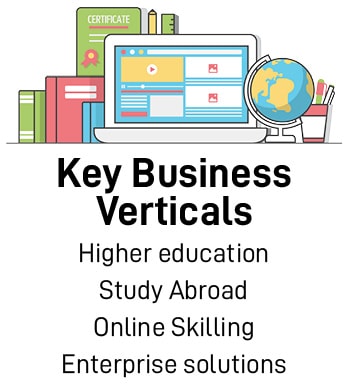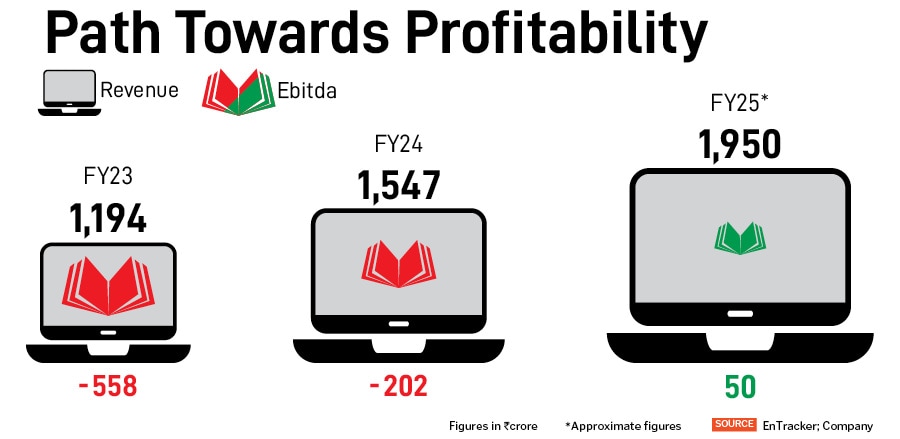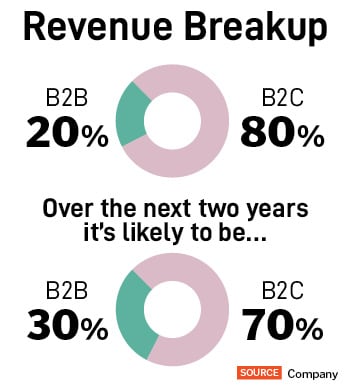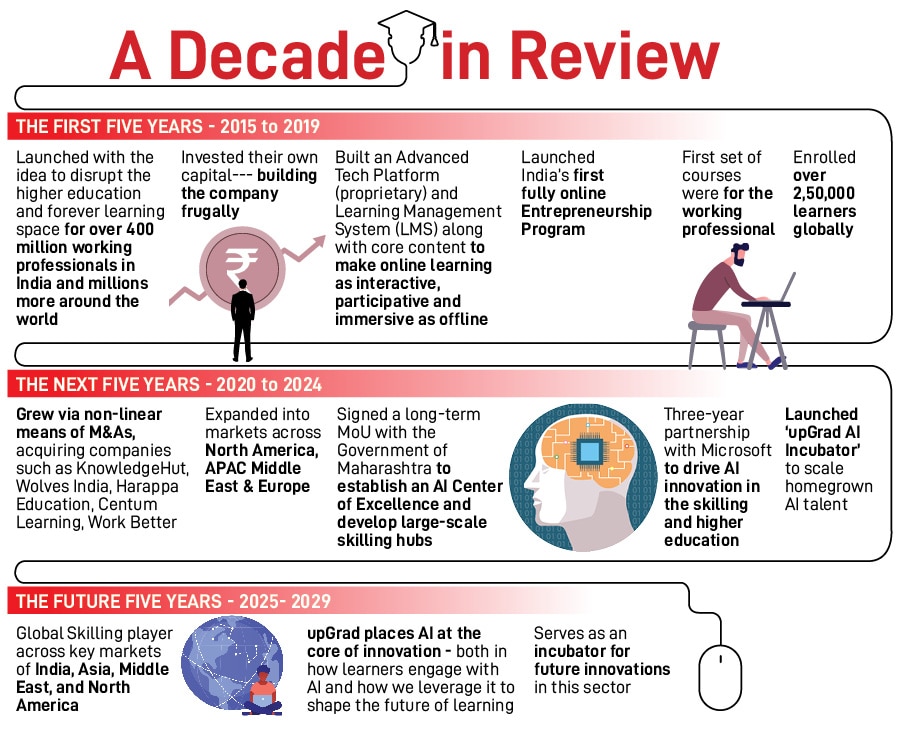 (From left )Mayank Kumar, co-founder and MD of Upgrad,Ronnie Screwvala, Co-founder and Chairperson upGrad and Skrikanth Iyengar, CEO, upGrad
(From left )Mayank Kumar, co-founder and MD of Upgrad,Ronnie Screwvala, Co-founder and Chairperson upGrad and Skrikanth Iyengar, CEO, upGrad
Education and skilling company upGrad completed 10 years on March 23. Co-founder and Chairperson Ronnie Screwvala, however, believes that the company’s journey truly began only five years ago in 2020.
During those early years, the team developed content in-house, in collaboration with universities. This was not simply about converting offline courses to an online format, but delivering an interactive learning experience directly to students and working professionals. Their decision to reach students directly was a deliberate move. “At the time, everyone told us, why don’t you start with B2B first [enterprise solutions catered to corporate employees and working professionals] or the partly offline model,” recalls Screwvala, as online higher education was not widely valued at the time and sceptics wondered whether students will be ready to invest heavily in online degrees.
This strategy seems to have paid off, with the company increasing its revenue from Rs1,547 crore in 2024 to approximately Rs1,950 crore in 2025. Over the next two years, upGrad expects its B2C vertical to occupy 70 percent of overall revenue share (see box).
With an initial public offering (IPO) now on the horizon, upGrad wants to strengthen its core verticals—higher education, online skilling, study abroad, and enterprise solutions. It is also intensifying focus on artificial intelligence (AI) through partnerships with government bodies and organisations, including Microsoft and the Government of Maharashtra. The company is dipping its toes in international markets, like North America, the Middle East and Vietnam.
upGrad is an outlier of sorts in the Indian edtech sector, which has undergone fluctuations over recent years, leading to the decline of its more gigantic peers like Byju’s and Unacademy.
Co-founder Mayank Kumar says that a company’s long-term viability in this space hinges on how wisely it utilises capital. He believes that upGrad’s prudent approach to financial efficiency has helped it earn the reputation of being the “Last Man Standing”. Reflecting on the sector’s struggles, Screwvala, notes that “a lot of capital has entered a sector that didn’t need it and was eventually mismanaged”.
That said, the long-term potential of the edtech sector remains robust, with the Internet and Mobile Association of India (IMAI) and Grant Thornton Bharat valuing the sector currently at $7.5 billion and projecting a growth to $29 billion by 2030.
The business of edtech in India is divided into four major segments—school education, test preparation, study abroad, and working professionals. upGrad chose to focus on the latter two. Explaining the challenges with business models focused on school education, Mayank Kumar, co-founder, upGrad, says that it takes many years for businesses in this space (or the K-12 model, as it is called) to see outcomes. Moreover, there is an element of “force selling”, as companies onboard students not by reaching them directly, but by selling the courses to the parents instead. Similarly, in test preparation, the outcomes are straightforward—students either pass or fail. “Here too, the more sustainable option is offline,” he says.
 In the study abroad space, while most players in the space act as ‘agents’ to send students abroad, Kumar says, their business model helps students to start their studies online in their home country, and then transfer them to the universities abroad to complete their degrees. This approach, he adds, reduces costs, while providing international exposure and quality education. They work with over 54 university partners in nine countries, including the University of Sussex (UK), Arizona State University (USA), Deakin University (Australia) and Paris School of Business (France). “We are providing the education, where again the outcome is very clear.”
In the study abroad space, while most players in the space act as ‘agents’ to send students abroad, Kumar says, their business model helps students to start their studies online in their home country, and then transfer them to the universities abroad to complete their degrees. This approach, he adds, reduces costs, while providing international exposure and quality education. They work with over 54 university partners in nine countries, including the University of Sussex (UK), Arizona State University (USA), Deakin University (Australia) and Paris School of Business (France). “We are providing the education, where again the outcome is very clear.”
When it comes to online skilling programmes, upGrad trains working professionals in diverse domains, such as data science, AI, digital marketing, product management, leadership and business analytics. The approach combines online learning, mentorship from industry experts, real-world projects, and certifications from universities and organisations to bridge the gap between education and employability.
Also read: How to reform higher academia for India’s economic and technological development
Upskilling and Enterprise
Upskilling is an important focus for the company, with Screwvala likening the dynamic nature of the corporate world to a “game of snakes and ladders”, where every leader has a validity and expiry date. The only way to ensure longevity and stay relevant is to upskill, he adds.
The company’s approach to skilling stand on a few key pillars, which include leveraging artificial intelligence (AI), bridging talent and employment gaps in rural and urban India, and identifying emerging areas and creating bespoke educational and skilling programmes for them.
Since 2020, the company has been providing enterprise solutions, which is learning and development programs for businesses to upskill their workforce. Their clients in this space include Reliance Retail, HCL Tech, Walmart Global Tech India, Army Welfare Placement Organisation (AWPO), and Kotak Mahindra Bank. upGrad has made strategic acquisitions across segments of the enterprise space, such as Harappa Education, Centum Learning and Work Better.

These were consolidated into a unified platform called upGrad Enterprise, which occupies nearly 20 percent of the total revenue today, and is expected to rise to 30 percent in the next two years as the company expands to global markets. “There are certain capabilities that we have built here at scale, which transcend boundaries. If you’ve got credentials with global companies operating in India, it’s only natural to say that we could do this across the board,” says Srikanth Iyengar, CEO, upGrad Enterprise.
The company is also expanding its offline presence by setting up counselling centres for students. So, if you are coming out of a metro station, before going home, you can stop buy and get a counselling session done,” says Kumar, explaining that in India jo dikhta hai woh bikta hai (what is visible is what sells). “If you’re not visible for an individual consumer, it gets very difficult. It also has a fall back effect on the enterprise business [given that the visibility increases the chances of businesses approaching upGrad with B2B solutions]. “The offline business will also help establish trust and credibility, Kumar explains, especially with the Study Abroad programmes that involve heavy financial commitment from the students and parents.
Powered by AI
In February 2025, upGrad launched an incubator to scale homegrown AI talent who can experiment and create products to solve problems “without any external pressures”, says Screwvala. The company has set aside Rs100 crore in its initial phase to drive product innovation by providing talent infrastructure and minimum seed capital.
 In today’s world, AI is elementary. “It’s a bit like what digital marketing was 8-10 years back. You couldn’t run an organisation without understanding digital marketing,” says Screwvala. upGrad is focusing on three key areas in AI: Leveraging it to skill workforces, educating and skilling individuals on AI, and building a talent pool capable of driving innovation in AI. “Having AI capabilities is not a calendared program anymore; it’s a fundamental or bare minimum skill. India is sitting at an epicentre where not only do we want to disrupt, but also be the disruptor,” he says.
In today’s world, AI is elementary. “It’s a bit like what digital marketing was 8-10 years back. You couldn’t run an organisation without understanding digital marketing,” says Screwvala. upGrad is focusing on three key areas in AI: Leveraging it to skill workforces, educating and skilling individuals on AI, and building a talent pool capable of driving innovation in AI. “Having AI capabilities is not a calendared program anymore; it’s a fundamental or bare minimum skill. India is sitting at an epicentre where not only do we want to disrupt, but also be the disruptor,” he says.
The company has signed a Memorandum of Understanding (MoU) with the Government of Maharashtra to build AI Excellence Centres across the state. With an initial outlay of Rs2,150 crore, the initiative aims to equip over 1 million students in AI and emerging technologies. “Our next set of workforce is going to come from Nagpur, Nashik, Sholapur, as much as it will from Mumbai and Pune,” says Screwvala. The initiative wants to empower around 250,000 rural youngsters in underserved areas. It will train professionals and foster rural entrepreneurs, including in the not-for-profit sector. “It is key to work with the government, given that close to 25 percent of the workforce is being employed by them,” he adds.
Additionally, as part of the Maharashtra State University of Eminence initiative—a project to elevate the state’s higher education landscape—the upGrad-supported ATLAS SkillTech University will focus on creating bespoke hybrid programmes in emerging arenas, including design, digital transformation, technology, AI, and gaming. “This partnership will open doors to a wider segment to access that pedagogy and content,” Screwvala says.
The company has also entered a three-year partnership with Microsoft to drive AI innovation in the skilling and higher education sectors. This collaboration will enable upGrad to certify its learners in AI training programs in association with Microsoft. The tech giant has made a commitment to equipping 1 million STEM learners in India, including early- to mid-career professionals, with foundational and advanced AI skills by 2025.
“We need to skill at scale, and partnering with a platform like Microsoft gives you that access. Having a platform with that kind of computing power, helps us immensely. It’s less of a commercial objective, but more about opening up the market for us,” explains Screwvala.
Leveraging Microsoft 365 Copilot, GitHub Copilot, and Azure OpenAI Service (AOAIS), upGrad wants to enhance outcomes for millions of learners across India and South Asia. GitHub Copilot helps the content developers on upGrad to create impactful learning materials, saving over 6,500 hours annually and improving code quality by 85 percent.

The Road Ahead
Opening up the skilling market remains a significant challenge for upGrad, which ties in with their challenges to improve affordability and accessibility of courses. “I would have loved to have opened up this market much more. It is possibly my biggest regret, challenge and opportunity,” says Screwvala. Elaborating on this, he explains, “The urgency to upskill yourself is not there. If you’re out of a job, you’re insecure. If you’re in a job, you feel okay, tomorrow. So there is no real return on investment (ROI) linked to upskilling.” He believes that addressing this challenge requires either creating a sense of urgency around upskilling or offering more accessible price points. According to Screwvala, tackling this challenge requires innovations in pricing models, expanded partnerships, technological advances, and inclusive financial support systems. Taking steps in this direction, upGrad’s tie-ups with organisations like Microsoft, and the government of Maharashtra, allow for mass-level access at lower costs, he explains.
The consumer side of the business contributes close to 80 percent to the total revenue, and over the next two years, Screwvala expects it to go to 70 percent, as the enterprise business is growing fast. “It is important that we keep the focus on the consumer side of the business, because when you want to open up a market, you can’t open it via someone,” he says.
Globally, upGrad is forging expansion plans across both consumer and enterprise segments. The US is a key market, and while it is not price-sensitive like India, it is highly competitive. This eliminates the need to “open up” the market there. Southeast Asia, particularly Vietnam, is a strong growth region for the company. “It’s a large market size, with ambitions way above China, and they’re hungry. I do not need to remind people to finish their course, like we do here. There, if they’ve paid for it, they want to get the most of it,” Screwvala notes. upGrad claims to be generating $1 million in monthly revenue in Vietnam. The Study Abroad vertical is also performing well in Vietnam as many students share aspirations similar to those in India—studying abroad and eventually returning. The company is also making inroads in the Middle East.
While Screwvala says that an IPO is likely to happen in the next two years, he downplays the timeline with humour: “This is not a countdown for us, there’s no digital board outside that goes tick-tick every day.” On a more serious note, he explains that the IPO is not about securing funding, but about building credibility.
He acknowledges that the bankruptcy of edtech companies like Byju’s has impacted the sector’s reputation, slowing market development for upGrad. “It definitely affected us and slowed down the opening up of the market for us, because it was not just about losing credibility with investors, but also among students and universities,” he says, adding that they no longer call upGrad an edtech company. “We are an integrated skilling and forever learning company,” he says.
